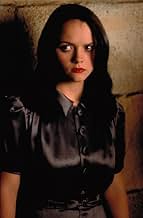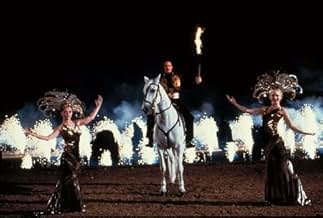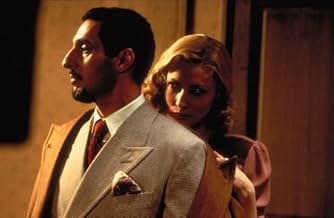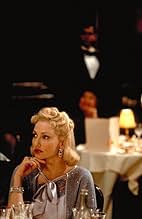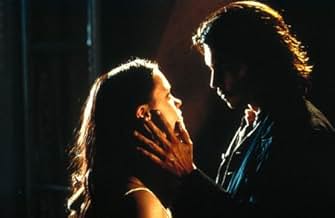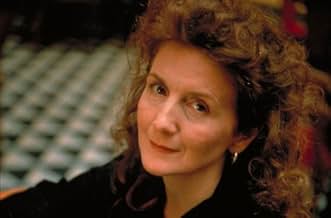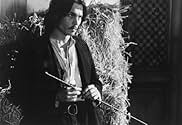VALUTAZIONE IMDb
6,1/10
16.922
LA TUA VALUTAZIONE
Una giovane rifugiata in viaggio dalla Russia all'America alla ricerca del padre perduto si innamora di un cavaliere zingaro.Una giovane rifugiata in viaggio dalla Russia all'America alla ricerca del padre perduto si innamora di un cavaliere zingaro.Una giovane rifugiata in viaggio dalla Russia all'America alla ricerca del padre perduto si innamora di un cavaliere zingaro.
- Regia
- Sceneggiatura
- Star
- Premi
- 3 vittorie e 3 candidature totali
Recensioni in evidenza
I did not know what to expect when I watched this film. What I did not anticipate, was that it would be so poignantly moving...very few films can actually reach out and involve the viewer to such an extent. There are many words that come to mind - haunting, sad, sweet, poetic...yet none of them capture the true essence of The Man Who Cried.
Sally Potter has done a wonderful job. This film suggests - it never really comes out and blatantly states. The scene with Cate Blanchette in the swimming pool is particularly beautiful. This film is so visually appealing - the graceful lines, the shadows, the colours...and that wonderful haunting music. Ms. Potter takes you into the minds of her characters, while the story floats and drifts around you in a collage of beautiful rich tones. She doesn't attempt to conceal the ugly face of war, but does not depict explicit violence as so many other directors do.
Johnny Depp and Christina Ricci are perfectly cast - unusual roles for both. They bring depth, intensity and meaning to their characters. Unlike Sleepy Hollow, this film is gentle and strong at once, while retaining something of the same gothic charm. Cate Balnchette also surprised me with her very unusual portrayal of Lola.
I would watch this movie all over again...and again...and again!
Sally Potter has done a wonderful job. This film suggests - it never really comes out and blatantly states. The scene with Cate Blanchette in the swimming pool is particularly beautiful. This film is so visually appealing - the graceful lines, the shadows, the colours...and that wonderful haunting music. Ms. Potter takes you into the minds of her characters, while the story floats and drifts around you in a collage of beautiful rich tones. She doesn't attempt to conceal the ugly face of war, but does not depict explicit violence as so many other directors do.
Johnny Depp and Christina Ricci are perfectly cast - unusual roles for both. They bring depth, intensity and meaning to their characters. Unlike Sleepy Hollow, this film is gentle and strong at once, while retaining something of the same gothic charm. Cate Balnchette also surprised me with her very unusual portrayal of Lola.
I would watch this movie all over again...and again...and again!
Christina Ricci sings more than she speaks in the movie, but she manages to hold your attention nevertheless for a pretty solid hour and a half in this well-acted and profound, but uneven period piece. Sally Potter, who also directed the similarly problematic "Orlando", clearly has the visual and thematic talent to be a much better respected director than she is - she just needs to learn how to tell a story.
The first forty minutes of the film, which begins in the year 1927, are absolutely masterful. The sublime Claudia Lander-Duke plays young Fegele, an impoverished Russian-Jewish girl whose beloved father decides to journey to America in search of a better life. After that, Fegele and her family are set upon by unnamed bad guys (probably either Cossacks or Communists), and Fegele is separated from them. She ends up on an ocean liner bound for England, where her name is changed to Susan, she is adopted by an English family that doesn't understand her, and she is forced to begin the process of assimilation.
Flash forward ten years or so (Potter is regrettably and consistently unspecific about such things). Fegele (now Suzie and now played by Christina Ricci, she of the large, expressive eyes) wants to be a showgirl so she can earn money to go to America and find her father. She auditions and is accepted by a group based out of Paris. Once in Paris, she rooms and becomes tight with fellow showgirl Lola (Cate Blanchett), a somewhat vapid and materialistic creature with no ambition save that of landing a rich man - which she manages to do in the form of opera singer and Mussolini supporter Dante Dominio (John Turturro, in one of his better performances). Around the same time, Suzie meets and falls in love with Cesare (Johnny Depp), the leader of a band of gypsies.
Once all the dominoes are in place, Potter wastes no time in knocking them down. You can see trouble coming a mile away: Lola, Suzie's one confidant who is aware of her Jewish ancestry, begins falling under the emotional and political spell of anti-Semitic, gypsy-hating fascist Dante. Meanwhile, the Nazis have invaded Poland and, despite everyone's self-assured predictions that they'll stop there, the French border is neither geographically nor historically distant. Suddenly, it's a race against time for all involved, but especially for Suzie - will she stay behind with her gypsy king, or, given a choice, will she escape certain death? The problem with all of this is that it's all so familiar. Potter adds nothing to the old story. There are some wonderful messages in this film about multiculturalism, nationalism, and the sometimes subtle nature of fascism, but if you don't care about the story you're not going to be interested in listening to the messages. The gypsy subplot, for instance, seems tacked on, like it was an excuse to give Ricci a love interest and have him be played by Johnny Depp.
The really interesting plot line here involves Lola and Dante, and I would pay ten dollars to see a movie that was just about them. Both Blanchett and Turturro create real, flesh-and-blood human beings, and it's in their scenes that Potter's writing really soars. Watching Dante sink deeper and deeper into a political philosophy fueled by his own insecurity while the irrepressibly optimistic Lola tries to turn a blind eye to it all is a fascinating and marvelous experience.
Ricci gives a good performance too, although occasionally that Valley Girl tone she uses in most of the rest of her movies slips out a little too much here and there. Fortunately, Potter doesn't give the shy, quiet Suzie very much to say. Most of her acting is done with her eyes, and she's really quite good. Johnny Depp does what he can with Cesare, but there's only so much an actor can accomplish when playing a plot device.
Art direction, music, and cinematography were all top-drawer. As is par for the course with Sally Potter's films, it looked good and had some interesting things to say. I just wish it had been more compelling.
The first forty minutes of the film, which begins in the year 1927, are absolutely masterful. The sublime Claudia Lander-Duke plays young Fegele, an impoverished Russian-Jewish girl whose beloved father decides to journey to America in search of a better life. After that, Fegele and her family are set upon by unnamed bad guys (probably either Cossacks or Communists), and Fegele is separated from them. She ends up on an ocean liner bound for England, where her name is changed to Susan, she is adopted by an English family that doesn't understand her, and she is forced to begin the process of assimilation.
Flash forward ten years or so (Potter is regrettably and consistently unspecific about such things). Fegele (now Suzie and now played by Christina Ricci, she of the large, expressive eyes) wants to be a showgirl so she can earn money to go to America and find her father. She auditions and is accepted by a group based out of Paris. Once in Paris, she rooms and becomes tight with fellow showgirl Lola (Cate Blanchett), a somewhat vapid and materialistic creature with no ambition save that of landing a rich man - which she manages to do in the form of opera singer and Mussolini supporter Dante Dominio (John Turturro, in one of his better performances). Around the same time, Suzie meets and falls in love with Cesare (Johnny Depp), the leader of a band of gypsies.
Once all the dominoes are in place, Potter wastes no time in knocking them down. You can see trouble coming a mile away: Lola, Suzie's one confidant who is aware of her Jewish ancestry, begins falling under the emotional and political spell of anti-Semitic, gypsy-hating fascist Dante. Meanwhile, the Nazis have invaded Poland and, despite everyone's self-assured predictions that they'll stop there, the French border is neither geographically nor historically distant. Suddenly, it's a race against time for all involved, but especially for Suzie - will she stay behind with her gypsy king, or, given a choice, will she escape certain death? The problem with all of this is that it's all so familiar. Potter adds nothing to the old story. There are some wonderful messages in this film about multiculturalism, nationalism, and the sometimes subtle nature of fascism, but if you don't care about the story you're not going to be interested in listening to the messages. The gypsy subplot, for instance, seems tacked on, like it was an excuse to give Ricci a love interest and have him be played by Johnny Depp.
The really interesting plot line here involves Lola and Dante, and I would pay ten dollars to see a movie that was just about them. Both Blanchett and Turturro create real, flesh-and-blood human beings, and it's in their scenes that Potter's writing really soars. Watching Dante sink deeper and deeper into a political philosophy fueled by his own insecurity while the irrepressibly optimistic Lola tries to turn a blind eye to it all is a fascinating and marvelous experience.
Ricci gives a good performance too, although occasionally that Valley Girl tone she uses in most of the rest of her movies slips out a little too much here and there. Fortunately, Potter doesn't give the shy, quiet Suzie very much to say. Most of her acting is done with her eyes, and she's really quite good. Johnny Depp does what he can with Cesare, but there's only so much an actor can accomplish when playing a plot device.
Art direction, music, and cinematography were all top-drawer. As is par for the course with Sally Potter's films, it looked good and had some interesting things to say. I just wish it had been more compelling.
The film, though highly predictable, is not anywhere near as bad as people make it out to be. It's not boring unless your attention span is that of the typical Hollywood absorbed moron. The acting isn't anything worse than the typical product of that filmworld - though it is slightly better. The story, also, is not a completely typical waste. Now that I've mentioned all of these things about the typical, that is unfortunately exactly what this film is: extremely typical beyond comprehension. Everything, down to the lame, supposedly romantic, slow motion scene of Johnny Depp riding his horse, has been done 3049090348 hundred thousand times before. Most of the story makes a remote amount of sense, except that the Russian soldiers who force Ricci's family to leave Russia for some reason that I must have missed are peaking Polish. Well, in the end, since the composition is pretty interesting, and the music is great, it is worth seeing - unless you have no idea about these things and would rather watch Bruce Willis blow things up.
My entire reason for bringing this film home was the cast: Christina Ricci, Cate Blanchett, John Turturro and Johnny Depp. Each of the actors are phenomenal and have talent in spades, and to see them all together in a film with such great characters was a delight. However, this is one of those movies where there is no fast-paced, witty dialog, no car chases and no gratuitous sex. It is about the characters. Therefore, many will find its plot slow and dull. This movie was not made for mass appeal. Many will find it to be beautiful and meaningful, while others will not sit through the first half hour. With that said, I will now say how much I loved this movie. It was visually stunning, superbly acted and has a score to match. While I have always enjoyed Christina Ricci and found her to be quite attractive, I have never seen her look as beautiful as she does in this film. Cate Blanchett is as wonderful as she always is, proving once more she is one of today's most versatile and convincing actors. Johnny Depp and John Turturro are also both excellent in their roles. Overall, I would have to recommend this to anyone who enjoys good character development/superb acting.
The only reason I did not rate this film a "10" was that the Christina Ricci character (Feygele/Suzie), who is supposed to be a superb singer in the era before microphones, was not dubbed by someone who can actually sing. (Ricci, gifted actress that she is, can't, and to a musician, that's a problem). Other than that, I loved this movie. Ricci and Depp, as impossible lovers who just happen to be members of the two peoples most persecuted by the Nazis (a Jew and a Gypsy), are both perfection in their roles. John Tuturro and Cate Blanchett, as (respectively) an Alpha-male Italian tenor enamored of Mussolini, and Suzie's fellow dancer/confidante seduced by the tenor and his Fascist tendencies, are such compelling characters that they almost needed their own separate movie. The cinematography is beautiful throughout, and the sense of history, of the sweep of time, is wonderfully evoked. Last but not least, the score of the film memorably weaves together an old Yiddish lullaby with "Je crois entendre encore," the great tenor aria from Bizet's "Pearl Fishers." Both melodies share the same rhythmic and harmonic skeleton, and the film score reveals and celebrates it. A wonderful musical reflection on the theme of the film in general. Wait until the end of the movie to see what I mean -- the music explains it all.
Lo sapevi?
- QuizChristina Ricci and Johnny Depp found it strange and amusing to do sex scenes with each other because they first met when she was 9 and he was 26, when he visited the set of her debut film Sirene (1990) to see his then-girlfriend Winona Ryder. She said during an interview with ABC News, "I've known Johnny so long, he's protective of me as an older brother and it's weird to think of having sex with him. So we know enough about each other to laugh at it. He said it was 'like we were rooting around together like pigs.' Anyway, I don't think you ever really deal with sexuality on-screen. There are, like, 50 people watching you, and you're just, like, 'Uh, I hope my ass looks good.' There's no deep feeling there. It's just embarrassing."
- BlooperIn the scene where Suzie is following Cesare and his friends on her bike, they go through a passage where you can see the Eiffel Tower in the background and it is lit up. However, the lights were not added to the Tower until 1986.
- Colonne sonoreJe crois entendre encore (Yiddish Version)
from "The Pearl Fishers"
by Georges Bizet
Performed by Salvatore Licitra and Orchestra of the Royal Opera House
Concertmaster Vasko Vassilev
I più visti
Accedi per valutare e creare un elenco di titoli salvati per ottenere consigli personalizzati
- How long is The Man Who Cried?Powered by Alexa
Dettagli
- Data di uscita
- Paesi di origine
- Sito ufficiale
- Lingue
- Celebre anche come
- The Man Who Cried
- Luoghi delle riprese
- Parigi, Francia(on location)
- Aziende produttrici
- Vedi altri crediti dell’azienda su IMDbPro
Botteghino
- Lordo Stati Uniti e Canada
- 747.092 USD
- Fine settimana di apertura Stati Uniti e Canada
- 93.455 USD
- 27 mag 2001
- Lordo in tutto il mondo
- 1.322.763 USD
- Tempo di esecuzione1 ora 40 minuti
- Colore
- Mix di suoni
- Proporzioni
- 1.85 : 1
Contribuisci a questa pagina
Suggerisci una modifica o aggiungi i contenuti mancanti


